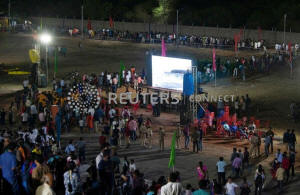India's second lunar mission delayed due to 'technical snag': ISRO
 Send a link to a friend
Send a link to a friend
 [July 15, 2019]
BENGALURU (Reuters) - India's space
agency said it delayed the launch of its second lunar mission,
Chandrayaan-2, in the early hours of Monday due to a "technical snag"
which was observed less than an hour before the scheduled liftoff. [July 15, 2019]
BENGALURU (Reuters) - India's space
agency said it delayed the launch of its second lunar mission,
Chandrayaan-2, in the early hours of Monday due to a "technical snag"
which was observed less than an hour before the scheduled liftoff.
"A technical snag was observed in launch vehicle system at T-56 minute,"
the Indian Space Research Organization (ISRO), said in a tweet. "As a
measure of abundant precaution, Chandrayaan2 launch has been called off
for today."
The mission, which the ISRO chairman said is the most complex mission it
has ever undertaken, was scheduled to launch at 09:21 p.m. GMT, or 02:51
a.m. local time on the Geosynchronous Satellite Launch Vehicle (GSLV)
Mark III rocket.
ISRO said it will announce the revised launch date later. India
successfully carried out its first lunar mission, Chandrayaan-1, nearly
11 years ago.
The 10-billion rupee ($146 million) mission, if successful, would boost
India's aspirations to catch up with global space leaders United States
and China and put it in a better position to compete in the commercial
space market.
A success would make India only the fourth country behind the United
States, Russia and China to perform a "soft", or controlled, landing on
the moon and put a rover on it.
[to top of second column]
|

Spectators leave a viewing gallery after India's second lunar
mission, Chandrayaan-2, was called off, in Sriharikota, India, July
15, 2019. REUTERS/P. Ravikumar

This would be the third attempted moon landing this year after
China's successful Chang'e-4 lunar probe and Israeli spacecraft
Beresheet, which failed and crashed on to the moon in April.

(Reporting by Shubham Kalia; Additonal reporting by Chris Thomas and
Sachin Ravikumar in Bengaluru; Editing by Susan Thomas)
[© 2019 Thomson Reuters. All rights
reserved.]
Copyright 2019 Reuters. All rights reserved. This material may not be published,
broadcast, rewritten or redistributed.
Thompson Reuters is solely responsible for this content. |